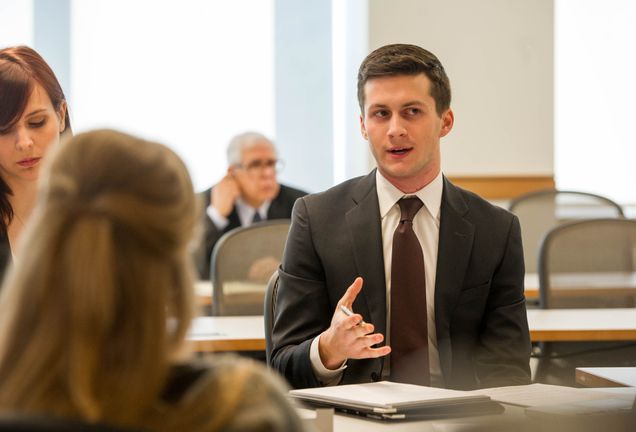Lawyering Lab Builds Hands-on Transactional Work into the First Year
BU Law’s innovative Lawyering Lab exposes law students to core skills often neglected in first year curricula.

Much of a lawyer’s job takes place not in a courtroom but around a table. Negotiation, client counseling, and contract drafting make up the core set of skills every budding lawyer needs to master, no matter the type of practice they plan to enter. Recognizing the need to develop these skills, Boston University School of Law launched its Lawyering Lab in the winter of 2015. An intensive, one-week course required of all first-year law students, the Lawyering Lab provides hands-on, practical training in the first year of study.
Each winter, the first-year class is broken into small groups and assigned either side of a real-life business deal from 1995. Under the supervision of doctrinal and clinical faculty, each team meets with a “client” played by a practicing attorney—often an alumnus who has volunteered their time to coach the attorneys in training. Teams on both sides of the transaction identify the legal constraints and opportunities presented, and collaborate under tight deadlines to identify, assess, and recommend options for action. Students will counsel their client on a course of action, and negotiate and draft contractual provisions with opposing counsel.
First-year student MyShawndria Ward (’18) noted the benefit of putting the skills she learned in the classroom into practice so early in her law-school career. “The Lawyering Lab taught us applicable skills for those who want to go into any type of law, and reinforced some of the skills that we have been learning in our first semester of class,” Ward says. “Although the hours were long, and I missed the sunny California weather, I feel like it was a very valuable experience.”
Kathryn Ostman, an associate with Morgan Lewis who represents clients in energy industry transactions, acted as a client in this year’s Lab. “When I graduated in 2008, BU Law didn’t yet have a transactional law program,” she says. “We learned the theoretical underpinnings of corporate law, and gained experience as summer associates, but it was difficult to get a sense of what an attorney in this type of practice actually did. I’m happy to see this added to the curriculum.”
Building on BU Law’s Transactional Law Program, the Lawyering Lab offers the unique opportunity to cultivate transactional skills in a collaborative setting. These skills, not only in contract drafting and negotiation, but also basic professionalism, public presentation, and quick thinking, are extremely useful after a semester of theoretical learning. Students put the doctrine they have just learned into practice and give themselves an edge in the search for summer employment.
Following the client counseling simulations, students are encouraged to assess the their performance and that of their team as a whole before moving into a larger group debrief. Attorney volunteers are encouraged to offer feedback and advice based on their own experiences. “Any time you can get students in front of a practicing attorney, it’s a valuable experience,” says Nancy Barton Scholar and Professor of Law Kathryn Zeiler, who oversaw several teams during the client counseling simulations, “not just for the networking, but to expose them to realities of day-to-day lawyering.”
“The simulations gave us great insight into what a lawyer really does from day to day and incorporated the skills you need that cannot be learned from a textbook,” says Erica Santos (’18). “I came into law school with plans of pursing a career in transactional law and it was really nice to have this experience as early as my 1L year.”
